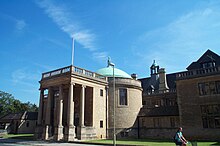User:HarkenMotet/sandbox
Scholarships and financial support[edit]

There are many opportunities for students at Oxford to receive financial help during their studies. The Oxford Opportunity Bursaries, introduced in 2006, are university-wide means-based bursaries available to any British undergraduate. With a total possible grant of £10,235 over a 3-year degree, it is the most generous bursary scheme offered by any British university.[1] In addition, individual colleges also offer bursaries and funds to help their students. For graduate study, there are many scholarships attached to the university, available to students from all sorts of backgrounds, from Rhodes Scholarships to the relatively new Weidenfeld Scholarships.[2] Oxford also offers the Clarendon Scholarship which is open to graduate applicants of all nationalities.[3] The Clarendon Scholarship is principally funded by Oxford University Press in association with colleges and other partnership awards.[4][5] In 2016, Oxford University announced that it is to run its first free online economics course as part of a “massive open online course" (Mooc) scheme, in partnership with a US online university network.[6] The course available is called ‘From Poverty to Prosperity: Understanding Economic Development’.
Students successful in early examinations are rewarded by their colleges with scholarships and exhibitions, normally the result of a long-standing endowment, although since the introduction of tuition fees the amounts of money available are purely nominal. Scholars, and exhibitioners in some colleges, are entitled to wear a more voluminous undergraduate gown; "commoners" (originally those who had to pay for their "commons", or food and lodging) are restricted to a short, sleeveless garment. The term "scholar" in relation to Oxford therefore had a specific meaning as well as the more general meaning of someone of outstanding academic ability. In previous times, there were "noblemen commoners" and "gentlemen commoners", but these ranks were abolished in the 19th century. "Closed" scholarships, available only to candidates who fitted specific conditions such as coming from specific schools, now exist only in name.
High Speed 2 (HS2) is a planned high-speed railway in the United Kingdom linking London, Birmingham, the East Midlands, Leeds, Sheffield and Manchester.[7][8] It would be the second high-speed rail line in Britain, after High Speed 1 (HS1) which connects London to the Channel Tunnel. The line is to be built in a "Y" configuration, with London on the bottom of the "Y", Birmingham at the centre, Leeds at the top right and Manchester at the top left. Work on the first phase is scheduled to begin in 2017, reaching Birmingham by 2026, Crewe on the left leg of the "Y" by 2027, and fully completed by 2033.
Carlisle, Edinburgh, Glasgow, Liverpool, Newcastle, Preston and York will be linked to the network by HS2 trains running over existing slower tracks or edge-of-town HS2 stations. The HS2 project is being developed by High Speed Two (HS2) Ltd, a company limited by guarantee established by the UK government and has a projected cost of £56 billion.[9] Peak hour capacity leaving Euston will more than triple once HS2 is running, increasing from 11,300 to 34,900.
The project is to be built in two phases. Phase 1 is from London to the West Midlands and phase 2 from the West Midlands to Leeds and Manchester. Phase 2 is split into two sub-phases. Phase 2a is from the West Midlands to Crewe. Phase 2b will extend the project from Crewe to Manchester, and the West Midlands to Leeds.[10] The government’s decision will go through the parliamentary process for approval. Although Parliament has approved the first two phases of construction, precise details of the plan and route have not been formalised, and are still open to negotiation and change. For example, the spur to Heathrow airport was dropped from phases one and two in 2015,[11] as was the HS1 to HS2 link, while the Crewe Hub has been added to the scheme.[12]
- REDIRECT OnTheMarket
- From a page move: This is a redirect from a page that has been moved (renamed). This page was kept as a redirect to avoid breaking links, both internal and external, that may have been made to the old page name.
- ^ "Oxford Opportunity Bursaries". University of Oxford. Retrieved 9 October 2007.
- ^ Shepherd, Jessica (22 March 2007). "Oxford targets bright young things of eastern Europe". The Guardian. UK. Retrieved 9 October 2007.
- ^ "Eligibility criteria, Clarendon Fund Scholarships". Clarendon.ox.ac.uk. Retrieved 11 April 2014.
- ^ "History of the Clarendon Fund, Clarendon Fund Scholarships". Clarendon.ox.ac.uk. 1 September 2011. Retrieved 11 April 2014.
- ^ "Partnership awards, Clarendon Fund Scholarships". Clarendon.ox.ac.uk. Retrieved 11 April 2014.
- ^ "Oxford University to launch first online 'Mooc' course". BBC News. 15 November 2016. Retrieved 21 November 2016.
- ^ "HS2: Phase one of high-speed rail line gets go-ahead". BBC News. 10 January 2012.
- ^ Cite error: The named reference
Dft Go aheadwas invoked but never defined (see the help page). - ^ "CHAPTER 2: THE COST OF HS2".
- ^ "HS2: North West and Yorkshire Routes Confirmed". BBC News. 15 November 2016. Retrieved 15 November 2016.
- ^ "HS2: Heathrow spur plans dropped by transport minister". BBC News. 10 March 2015. Retrieved 1 December 2015.
- ^ "HS2 Birmingham to Crewe link to open six years early". BBC News. 30 November 2015. Retrieved 1 December 2015.
